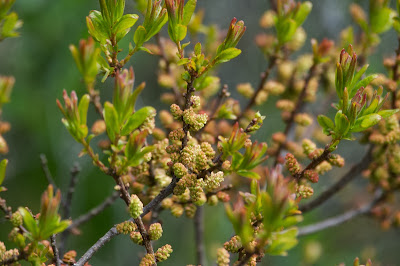The trail to the dunes leads to a boardwalk running out through the dunes to the shore.
At its end is a fine sandy beach, facing the Gulf of St. Lawrence.
A binocular scan over the sea turned up a White-winged Scoter (Melanitta fusca), one of a group of ocean-going diving ducks.
The way out and back provided a good opportunity to sample the local flora, much of it in flower.
One of the more attractive flowers of the area belonged to the Red Chokeberry (Aronia arbutifolia), a highly soil-tolerant member of the rose family (Rosaceae) widespread in eastern North America. The flowers last only about a week, so the timing of our visit was just right to see them.
Some of the plants in flower here were the same as the ones growing along the Bog Trail in Cape Breton, the subject of my last post. Rhodora (Rhododendron canadense) seemed to do as well among the dunes as around the bog.
Here, too, were the tasseled white heads of Cotton Sedges (or cottongrasses) (Eriophorum sp.).
I found a variety of shrubs and small trees growing around the boardwalk. Alders (Alnus sp.) still bore their catkins...
...while young leaves of Red Maple (Acer rubrum) displayed colours that would not be visible again, once they have matured, until the autumn.
A few shrubs still held the dessicated remains of berries from the previous season.
White sprays of flowers adorned Chokecherry (Prunus virginiana) bushes, reminding me of childhood summers berry-picking with my grandmother.
Thick stands of fern filled much of the understory under the shrub layer...
...and herbaceous flowers dotted the trail edge. Yellow Goat's-Beard (Tragopogon pratensis) is an alien from Europe, as are so many of our roadside flowers.
From the boardwalk, I also had a chance to take portraits of a few common birds: a Swamp Sparrow (Melospiza georgiana)...
... a Common Yellowthroat (Geothlypis trichas), one of the wood warblers (Parulidae)...
and a Yellow Warbler (Setophaga petechia).
I have Red Squirrels (Tamiasciurus hudsonicus) in my back yard at home, but I couldn't pass up this fellow as he explored the boughs of a spruce tree. I suppose that if I am to see a mammal in Canada's smallest province, it ought to be a small one.





.jpg)

.jpg)
.jpg)
.jpg)
.jpg)
.jpg)
.jpg)

.jpg)

.jpg)

.jpg)
.jpg)
.jpg)
.jpg)
.jpg)
.jpg)
.jpg)
.jpg)
.jpg)
.jpg)
.jpg)
No comments:
Post a Comment